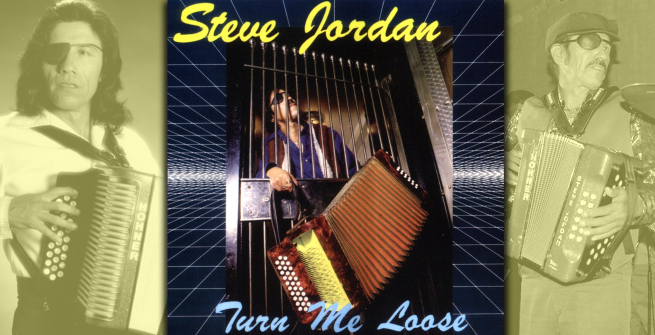Don’t call him the Jimi Hendrix of the accordion. The epithet frequently given to Tejano accordionist Esteban “Steve” Jordan (because of his instrumental virtuosity and penchant for effects pedals) was vehemently rejected by the artist himself. In fact, don’t even try to box him into a genre, as he consistently rejected such stylistic confinements as well. So how does one define the eye-patched accordionist known as Steve Jordan, a.k.a El Parche? Leave out the superlatives and stick to the facts: Jordan was born in the south of Texas in 1939, started playing accordion at the age of 7 under the tutelage of Tejano accordion legend Valerio Longoria, went on to learn and play 35 instruments, had a recording career of over 4 decades during which he touched on many styles and genres including but not limited to rock, jazz, salsa, and conjunto, and took the accordion beyond its perceived limitations through his virtuosic playing and effects pedal-based sound manipulation. With the facts firmly in place, we can now add that Jordan created a magical music that could impulsively thrust people onto a dance floor with its groove and feel while also entrancing a critical headphoned listener with its swirling, echoing, pulsating accordion effects and polyrhythms. Aside from being magical, Jordan’s music is also importantly Tejano—the sound unique to southern Texas that combines influences from both sides of the Mexican-American border; a synthesis of many styles, genres, and subgenres. While Jordan’s music definitely explores a wide array of genres, it remains forever tethered to the Tejano orbit with the prominence of his accordion, the Spanish language lyrics, the “oompah” 2/4, and waltzing 3/4 rhythms, and the sweet vocal harmonies. The Tejano label is not a limitation, but rather a jumping-off point from which Jordan’s music leaps out and pulls in other exciting and enticing elements.
On his 1986 album, Turn Me Loose, Steve Jordan synthesizes his broad scope of interests and influences into a tight 10 songs, creating a “conjunto” sound, ironically, by playing every instrument himself, with the assistance of his son on some percussion. Throughout the course of Turn Me Loose the listener is treated to dance-inducing cumbia in the earworm album-opener “La Cumbia De Chon,” bouncing polka in “Piriwiris” and “La Polka Loca,” salsa and Latin jazz touches in “Cumbia Con Salsa” and “Canto Al Pueblo,” slow swinging lowrider oldies in “Vengo A Decirte” and “No Hay Razon,” among other far-out explorations in styles and genres. While the songs of Turn Me Loose can be described as they are above, they cannot be pigeonholed as such for they consistently stand out as something more at the hands of Jordan. For instance, “Vengo A Decirte” bears much in common with an oldies-style slow dance, but listen closely to that pulsating, phase-shifting, echoing accordion. Have you ever heard anything like it? Or in the endless soloing of “La Polka Loca” where Jordan actually plays the delay pedal like an instrument, harmonizing and bouncing notes off each other as they trail off into the distance. Or listen to the last instrumental minute of “Cocodrilo” where the electric guitar and bass team up to syncopate playfully against the drums and percussion, reminiscent of a South African timbre and rhythm section like that of Abafana Baseqhudeni, while high above the accordion gingerly solos chromatically, leaning into strange but not displeasing dissonances. One might say that Steve Jordan, especially in his approach to accordion, was experimental. He worked the “other” in with the familiar and ended up with something all his own: el sonido de Jordan.
Jordan’s ever-churning genre-blending kaleidoscopic sound is not limited to Turn Me Loose, though. It seems likely that he was never content to be a traditionalist and that he set out from the get-go to defy genre. His early work in the 60s with his brothers as Steve Jordan y Los Hermanos Jordan was very much rock, soul and R&B, and he played as a guitarist alongside Latin jazz percussionist Willie Bobo around that same time. On his 1983 album El Bro Jordan does an inventive rendition of The Righteous Brothers’ classic “You’ve Lost That Lovin’ Feeling” and goes full-on 70’s thriller movie funk on the track “Run, Tecato, Run.” Perhaps his insistent defiance of genre limitations makes him even more Tejano. To be Tejano is to combine cultures and styles across borders, creating something new. It could be that Jordan picked up the music where it was seeming to stagnate and jolted new life into it, continuing its growth and erasing its boundaries.
Whatever you want to call it, or whatever he didn’t want you to call it, the idiosyncratic music of Steve Jordan is instantly recognizable and always pleasing. Though he had a strong cult following scattered around the globe, and you can see him pop up in David Byrne’s film and accompanying soundtrack, True Stories, and Cheech Marin’s film, Born In East L.A., Jordan never gained the wide notoriety he sought and deserved, and sadly he passed away in 2010 still embittered. His music lives on though, well documented across a number of albums, and continues to be discovered by new ears, blowing minds anew regularly. Jordan’s mastery of his instrument and endless pursuit of far-out sounds may lead one to make a comparison to a more well-known guitar slinger of a similar musical ethos, but don’t call him the Jimi Hendrix of the accordion, for he is much more: He is the Steve Jordan of the accordion.
Turn Me Loose and other albums by Steve Jordan are available to stream on Freegal and hoopla.
The Les Blank/Chris Strachwitz documentary, Chulas Fronteras, is available on Kanopy. Though Chulas Fronteras doesn’t have Steve Jordan in it, it does contain interviews and performances by other important Tejano musical legends such as Flaco Jiménez, Lydia Mendoza and more.


